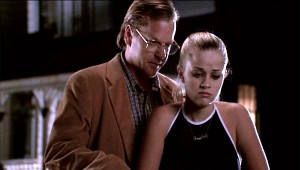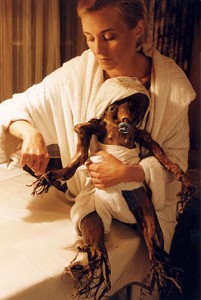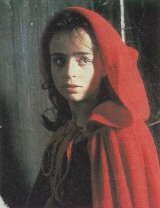Traditional fairy tales breathe new life in the world of cinema. These terror-filled stories told to children (often serving as parables) reincarnate well for surrealists and horror/exploitation aficionados alike.
Already steeped in metaphor, allegories like “Little Red Riding Hood,” “Hansel & Gretel” and “Alice In Wonderland” provide fertile ground for filmmakers. The implications of predatory sex exist as undertones in stories like Little Red Riding Hood, but are brought to much greater heights, and with more dramatic effect, in their retelling through modern films.

Freeway
The most accessible movie listed here (both in distribution, and for its broader audience base) is Matthew Bright’s postmodern exploitation/black comedy film, Freeway.
Reese Witherspoon’s character is suddenly thrust into a predicament, as her family is taken away. True to the fairy tale inspiration, she sets off on a journey to her grandmother’s house. The loose narrative of Little Red Riding Hood is used as a framework for Bright to weave this B-movie tale about a girl on the run. Lots of balanced shocks, thrills and laughs help to provide a fun watch.
The movie is a guilty pleasure, but with the sprinklings of serious subject matter and Witherspoon’s character-work, the film is elevated enough to find its place here.

Alice
Jan Svankmajer, the master Czech surrealist and animator, has translated two noteworthy fairy tales to film: Alice is a creepy, haunting adaptation of “Alice In Wonderland.” Every character is animated except for the little girl, Alice. Puppets, clay and meat are brought to life in a nightmarish fashion in this ultra-surreal (not for children) rendition of a classic tale. Alice is rich in imagery and utterly fascinating.

Little Otik
Little Otik is Svankmajer’s most accessible film to date. It is based on an old Czech fairy tale not popularly known in the west, portraying a husband and wife who are unable to conceive. Overt symbolism starts very early in the film, and the barrage of constant reminders concerning the couple’s barren state leaves them saddened and desperate.
In fulfillment of their need, a child is born out of a rooted stump from the backyard of a neighbor’s vacation home. The fantasy is given life through their obsession and the great orchestration required to deceive the neighbors about their newborn son, Otik.
The neighbor’s streetwise and precocious eleven-year-old daughter becomes privy to the situation as she simultaneously reads copies of “Sexual Disfunction and Sterility” and the fairy tale “Otesanek,” linking the two together. The couple’s greed and inability to do without is repaid in terror as Otik grows and feasts uncontrollably.

Criminal Lovers
Francois Ozon’s Criminal Lovers is a sexually charged tale of violence about a couple on the lam. The film makes an interesting transformation from a couple engaged in cold blooded murder to a twisted and sexually perverse rendition of “Hansel & Gretel.” This movie is one-of-a-kind, and was definitely not conceived for the conservative crowd, or even the easily disturbed, I mean, even the moderately disturbed.

The Company of Wolves
Neil Jordan (director of The Crying Game) delved deep into his adaptation of “Little Red Riding Hood” to create the memorable horror film, The Company Of Wolves.
The movie is chock full of symbolism and brilliantly references the fairy tale, as well as werewolf lore. It is not a casual watch by any means; so do not seek it out if you are looking for a standard horror movie. But, if you are looking for something different, The Company Of Wolves is very rewarding due to fine imagery and realized conception.
Until next time, I hope you have a great viewing experience. Comments are welcomed at cinespire@gmail.com.













